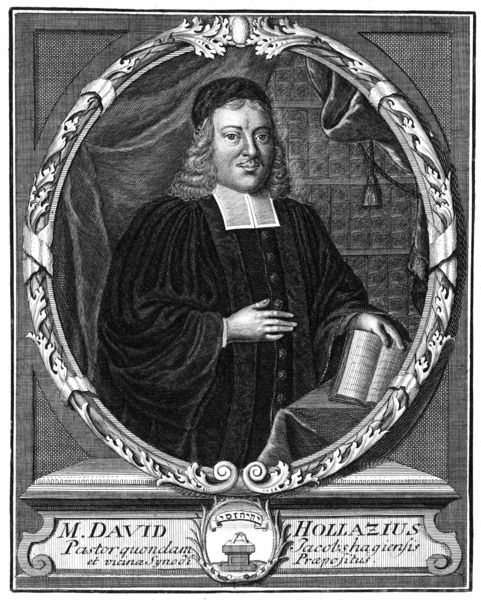David Hollatz (dogmatician) on:
[Wikipedia]
[Google]
[Amazon]
 David Hollatz ( Wulkow, near
David Hollatz ( Wulkow, near
The Restoration and Resurrection of the Dead (Part I)
Tr. by Kirk E. Lahmann
The Restoration and Resurrection of the Dead (Part II)
Tr. by Kirk E. Lahmann
The Highest Mystery of the Most Holy Trinity in the Old Testament
Tr. by Nathaniel J. Biebert
Baptism and the Means of Salvation
Tr. by Nathaniel J. Biebert
Studium Excitare: Biography of David Hollaz
by Kirk E. Lahmann {{DEFAULTSORT:Hollatz, David 1648 births 1713 deaths People from Stargard County People from the Province of Pomerania 18th-century German Lutheran clergy German Lutheran theologians German male non-fiction writers 17th-century Latin-language writers 18th-century German Protestant theologians 18th-century German male writers 17th-century German male writers University of Erfurt alumni University of Wittenberg alumni 17th-century German Lutheran clergy 17th-century Lutheran theologians 18th-century Lutheran theologians
 David Hollatz ( Wulkow, near
David Hollatz ( Wulkow, near Stargard
Stargard (; 1945: ''Starogród'', 1950–2016: ''Stargard Szczeciński''; formerly German language, German: ''Stargard in Pommern'', or ''Stargard an der Ihna''; csb, Stôrgard) is a city in northwestern Poland, located in the West Pomeranian V ...
(34 km ESE of Stettin
Szczecin (, , german: Stettin ; sv, Stettin ; Latin: ''Sedinum'' or ''Stetinum'') is the capital and largest city of the West Pomeranian Voivodeship in northwestern Poland. Located near the Baltic Sea and the German border, it is a major s ...
), in Pomerania
Pomerania ( pl, Pomorze; german: Pommern; Kashubian: ''Pòmòrskô''; sv, Pommern) is a historical region on the southern shore of the Baltic Sea in Central Europe, split between Poland and Germany. The western part of Pomerania belongs to ...
, 1648 - Jakobshagen (24 km E of Stargard) 17 April 1713) was a German Lutheran theologian. He studied at Erfurt
Erfurt () is the capital and largest city in the Central German state of Thuringia. It is located in the wide valley of the Gera river (progression: ), in the southern part of the Thuringian Basin, north of the Thuringian Forest. It sits in ...
and Wittenberg
Wittenberg ( , ; Low Saxon: ''Wittenbarg''; meaning ''White Mountain''; officially Lutherstadt Wittenberg (''Luther City Wittenberg'')), is the fourth largest town in Saxony-Anhalt, Germany. Wittenberg is situated on the River Elbe, north of ...
, and became preacher
A preacher is a person who delivers sermons or homilies on religious topics to an assembly of people. Less common are preachers who preach on the street, or those whose message is not necessarily religious, but who preach components such as ...
at Pützerlin near Stargard in 1670, at Stargard in 1681 (in 1683 also conrector), rector
Rector (Latin for the member of a vessel's crew who steers) may refer to:
Style or title
*Rector (ecclesiastical), a cleric who functions as an administrative leader in some Christian denominations
*Rector (academia), a senior official in an edu ...
in Colberg in 1684, and pastor
A pastor (abbreviated as "Pr" or "Ptr" , or "Ps" ) is the leader of a Christian congregation who also gives advice and counsel to people from the community or congregation. In Lutheranism, Catholicism, Eastern Orthodoxy, Oriental Orthodoxy and ...
in Jakobshagen in 1692.
Works
His principal work is his ''Examen theologicum acroamaticum'' (Rostock - afterward Stockholm - and Leipzig, 1707; 7th and 8th eds. by Romanus Teller, 1750 and 1763). The work is the last of the strictLutheran
Lutheranism is one of the largest branches of Protestantism, identifying primarily with the theology of Martin Luther, the 16th-century German monk and reformer whose efforts to reform the theology and practice of the Catholic Church launched ...
systems of dogmatics in the era of Lutheran orthodoxy
Lutheran orthodoxy was an era in the history of Lutheranism, which began in 1580 from the writing of the ''Book of Concord'' and ended at the Age of Enlightenment. Lutheran orthodoxy was paralleled by similar eras in Calvinism and tridentine Ro ...
. Hollatz knows Pietism
Pietism (), also known as Pietistic Lutheranism, is a movement within Lutheranism that combines its emphasis on biblical doctrine with an emphasis on individual piety and living a holy Christian life, including a social concern for the needy an ...
, but does not mention it, although he refutes mysticism
Mysticism is popularly known as becoming one with God or the Absolute, but may refer to any kind of ecstasy or altered state of consciousness which is given a religious or spiritual meaning. It may also refer to the attainment of insight in ...
. The system is divided into ''quaestiones'', which are explained by ''probationes''; these are followed by ''antitheses
Antithesis (Greek for "setting opposite", from "against" and "placing") is used in writing or speech either as a proposition that contrasts with or reverses some previously mentioned proposition, or when two opposites are introduced together f ...
'', against which the different ''instantia'' are brought forward. Hollatz also published ''Scrutinium veritatis in mysticorum dogmata'' (Wittenberg, 1711); ''Ein gottgeheiligt dreifaches Kleeblatt (Leidender Jesus)'' (1713); a collection of sermons; and other works.
References
*Translated Works
From ''Examen Theologicum Acroamaticum''The Restoration and Resurrection of the Dead (Part I)
Tr. by Kirk E. Lahmann
The Restoration and Resurrection of the Dead (Part II)
Tr. by Kirk E. Lahmann
The Highest Mystery of the Most Holy Trinity in the Old Testament
Tr. by Nathaniel J. Biebert
Baptism and the Means of Salvation
Tr. by Nathaniel J. Biebert
External links
Studium Excitare: Biography of David Hollaz
by Kirk E. Lahmann {{DEFAULTSORT:Hollatz, David 1648 births 1713 deaths People from Stargard County People from the Province of Pomerania 18th-century German Lutheran clergy German Lutheran theologians German male non-fiction writers 17th-century Latin-language writers 18th-century German Protestant theologians 18th-century German male writers 17th-century German male writers University of Erfurt alumni University of Wittenberg alumni 17th-century German Lutheran clergy 17th-century Lutheran theologians 18th-century Lutheran theologians